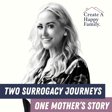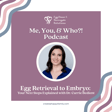Celebrating Nurses and Third-Party Reproductive Nurses
00:00:00
Speaker
May marks Nurse Appreciation Week, a special time to celebrate the incredible contributions of nurses. For us, it's an opportunity to specifically honor the third party reproductive nurses we work with every day.
Spotlight on Lauren Brown's Role at CCRM
00:00:17
Speaker
This year, we're shining a spotlight on one extraordinary nurse in particular, Lauren Brown, the lead third party coordinator at CCRM Houston.
00:00:28
Speaker
Lauren joined CCRM in 2018 after five years of experience as an inpatient nurse. She brings such warmth and passion to her role where she plays a crucial part in helping families navigate the complex journey of third party reproduction.
A Day in the Life of a Third-Party Coordinator
00:00:44
Speaker
In this episode, Lauren takes us through a typical day in her life as a third party coordinator, detailing the steps involved in the process, discussing timelines and offering an exclusive behind the scenes look at the CCRM clinic.
00:00:58
Speaker
Lauren has such a passion for helping others build their family.
00:01:01
Speaker
through the help of the amazing science and the generosity of others and it shows. We are immensely grateful for Lauren and the third party team at CCRM whose expertise and kindness make a profound difference in the lives of so many. So join us in celebrating Lauren and all the amazing nurses who make such a significant impact in the lives of so many. And please enjoy this episode.
Podcast Introduction to Surrogacy and Egg Donation
00:01:30
Speaker
me, you, and who? Who knew it would take more than two people to have a baby? In a world where infertility is no longer a taboo topic, this podcast will take you through all of the different aspects of surrogacy and egg donation through the lens of many who walk this journey in different ways. My name is Whitney Hall, and I am a two-time Surrogate Now Turned Surrogacy Coordinator for Egg Donor and Surrogate Solutions.
00:01:57
Speaker
the very agency I used when I chose to carry for two amazing families. With this podcast, it is our goal to help guide and support you as you learn about what it takes to grow a family in an alternative way, as well as hear inspiring and beautiful stories of how this path has changed lives forever. We can't wait for you to hear about just one more way happy families are created every day.
Managing a Busy Morning Schedule
00:02:26
Speaker
Okay. So Lauren Brown, one of my most favorite nurses that I get to work with. Oh my gosh. No, it's so true. It's so true. No, I love working with you. Okay. So tell me just like day in the life. We walk in in the morning and we walking in. That was clock in first. Absolutely. And then in the morning here, we do monitoring. So between seven 30 and eight, eight 15, we might see like 40 patients. Oh wow. Yeah. They just, we have them all show up at seven 30 people in and out. Cause we understand everybody's
00:02:56
Speaker
Most everybody has to get to work, got to drop the kids off, those kinds of things. We try to get people in and out real quick. They'll do their ultrasound, their blood work, and then we'll send them on their way. So you'll see a congregation of like all 10 nurses sitting out there. It's like NASCAR, where you're like, cleaning the rooms real quick, the next person in, so everybody can keep on going. And then they'll get called for labs inevitably at the time we call for their ultrasound. We're like, leave your spot in line, don't worry. So we do that usually until like 8.15, sometimes 8.30, it's a busy day, but most of the time I like leave. We're done with that.
00:03:24
Speaker
And then it's to my desk, I'm checking emails. We don't get as many emails that we have our new patient portal, which is great. Mainly because everybody can see the messages. If I'm out, you know, your message isn't going to go unlooked at because everybody can
Balancing Communication and Patient Needs
00:03:38
Speaker
see them. Absolutely. So we'll check the portal, see what kind of messages we have, check the emails, which is all my agency communication coming through, see who's got their legal clearance, who's starting a period, who's got a new match kind of situation. And then I have to kind of,
00:03:51
Speaker
prioritize and see what needs to be done today, what needs to be done later this afternoon, who needs a call right away, that kind of thing. And then let's go check the voicemails. You just have a bunch of voicemails from after I left yesterday. And then we go to the chart, see whose labs have come back in, and then just kind of figure out a game plan for what we're going to do. So some days I'm like, OK, we're just going to go one thing at a time. Some days I've got 40 million things to do. Let me do what's time sensitive first.
00:04:22
Speaker
my day goes. Oh my gosh. So I'm working, the emails are pouring in. Oh for sure. And so it's a lot in the calling patients. Usually around lunchtime the doctors start reviewing labs with people who are here today. Okay. And people cycle. A lot of my day is spent checking the fax machine because a ton of our third party patients do not live here in Houston. So I'm constantly checking the fax machine, see if their acid monitoring results came in so then I can go track down the doctor to respond because they're not going to be on the chart. So it's a lot of running around.
00:04:48
Speaker
You are doing a lot of running around. And then the phone calls. So then we've got to notify everybody who came. Right. Got to notify if it's a donor. Got to tell the donor. Got to call the IP with an update. Got to update our agency. Let them know. Thank you so much. Hey, when are they coming back in? Hey, her retrieval is going to be in two days. The DC cycle, same situation. Got to call the DC.
00:05:08
Speaker
Yeah. Got to schedule all the things. Always stay busy. Days go by real quick. I was going to say, I say you stay absolutely busy. So one of the things that I think is so, you know, every, I always say there's a lot of hurry up and wait. You're definitely just in the hurry. Um, but what would you say to maybe like agencies or intended parents, egg donors, just all entities, surrogates, you know, kind of as they're waiting.
00:05:33
Speaker
What would you say is I mean we want them to know like you are you're actively doing yeah, but like in the midst of that You know just hurry up and wait if you know if you have a doctor or a nurse that is truly Involved kind of maybe like what are some things that they need to be aware of as you're like during that waiting time?
Behind-the-Scenes Coordination and Challenges
00:05:51
Speaker
Real important is to know that there's always something going on like you said like if I'm not getting back to you because I just And a lot of times I don't have time to call and say hey, I don't have an update yet time
00:06:01
Speaker
So I will get back to you. We try our very best to like respond real quickly. That's one of the things we pride ourselves on. We try to get back to you within the day if possible. If not, I'm going to try to give you a realistic expectation. Yesterday, for example, I got three new GC records that need to be reviewed. So I had to say, hey, I didn't get to this today. I'm hoping to have it done by Friday. You know, that's my scenario. So this can be like a realistic timeframe because I understand like everybody's so anxious to get started. Usually it's a big process to get to the decision to
00:06:29
Speaker
And a lot of times people get, okay, we're ready to go like yesterday. Yeah. Oh, yeah. I'm so sorry. Like I want to make it happen as quick as I can, but we want to make sure like this makes sense. Right. We done our eyes. There's a lot going on behind the scenes before I can even call you. Yeah. So tell me a little bit more about like, what's that stuff behind the scene?
00:06:50
Speaker
Real, like reviewing records is a big process. Usually I get these packets of records. It's literally sometimes 500 pages that I have to go through. And a lot of times people haven't looked at them before. So you've got to go through and see if they're all positive. Except for this last year that nobody forgot to mention. Things like that that come up last week, actually. Has a whole new kind of worms that we've got to address in now. So we can't do anything, but we might have to wait a little bit. So it's a lot of reviewing records. It's probably the most time consuming thing.
00:07:20
Speaker
And a lot of it's waiting for the doctor. Because the doctors, you know, they're reviewing labs, but they're in with patients all day too. So we've got to catch them in between. So I'll be walking down the hall, stalking their doors. Usually when I finish with an appointment, the door will open. Um, so I'm like, what's it looking for? What's it looking for? I'm looking for a doctor. I'm trying to catch them in between. And they can send an email, but they may not look at their email. You send their stuff through the chart, especially if like outside monitoring.
00:07:44
Speaker
They don't recognize it because it doesn't come through the same way if people come here. So I have to nudge and say, hey, did you see that that I sent you? So that's very time consuming. And so a lot of times it's 3 o'clock and I've been waiting for the doctor all day. And people start calling me asking. And I'm like, I'm so sorry. I don't know yet. But I will call you before I leave. Yeah, for sure. So that's a lot of behind the scenes. I'm either waiting for the doctor to respond to me or to not be in with somebody so I can talk to them in person. Or I'm combing through a PDF of 500 pages trying to find them from stuff.
00:08:14
Speaker
Well, and I think that's one of the things that so I feel like that, you know, I pride our agency in is that we try, we do look at those records prior to try and catch those things. Like, Hey, there was a positive syphilis or, you know, whatever it may be. Um, and then we do that pregnancy history form, which I feel like is like a nice little helpful. Yeah. Everybody has to go back. Okay. No, but I left the nursing school on me too. They're like,
00:08:40
Speaker
Make sure that you trust what's on that checklist is correct. So I have a checklist for every single patient. That's fantastic. With all the required things, I'm a little bit type A.
00:08:47
Speaker
if you hadn't noticed. So I will go through even and we initial next to it. So there's certain people that they initial and I'm like, okay, I believe that they actually looked at it. And I'm like, I'm probably going to go back and look at it too, but sure. No, but that's so super helpful. I mean, again, it's that extra, I think that's great for all of, for our shared clients. They know for a fact that we, you know, between all of us have looked through. And it's not to say things don't still get missed, but kind of reduce as much as. Oh, sure. Human error. Because we don't want to delay them.
00:09:17
Speaker
got checked off, but wasn't really done. The main thing that's so nerve wracking is the genetic carrier screening. It takes forever to come back, but we keep running into these panels that don't line up, which from one lab to another, especially with the donor side. And then we've got to have somebody else repested. But if you do a different panel or something like that one might come back positive, like the donor hasn't been screened for. And then we're starting back at three weeks, square one again. So we've run into that a lot lately because labs keep closing. So that's another
00:09:46
Speaker
delayed things. It's just fun. I spent a lot of time. I'm not a geneticist, so I can come through, but some of them are listed as just a gene name versus the actual disease name. And I'm like, I can tell you that it looks like it's right, but you're going to have to talk to a firm. Right. And it's just a lot of, like, running around until we've finally gotten all the clearance stuff done, and then it's a little bit. Yeah, sailing. Yeah.
00:10:07
Speaker
I mean, you are definitely like that kind of traffic controller. It's like between, cause like you said, you're talking to all of these people, agency included, and you know, we're trying to traffic control with you. And, but I think that's one of the great things that is so wonderful about you and just great nurses in every clinic is that you guys, you know, are looking at that whole picture, but also it just gets way too confusing. Like I took her back from maternity leave. They were like, you got your back.
00:10:36
Speaker
Oh, I said it. I said, thank God Lauren's back. In third party, but she takes regular patients primarily. So she's kind of a helper for the third party. Yeah. So Rita was mostly doing it on her own with some help from Gwen. And I was the only person doing this for three or four years. Oh my gosh. We're going to hire somebody else. And I trained multiple people. I had one girl sit down with me for like a week and she literally looked at me and goes,
00:11:05
Speaker
I don't want your job, Lauren, if it's hard. And she left like a week later. You scared her away. What was scary? Just, I think it's just the amount of things to keep track of.
Lauren's Journey and Decision-Making in Fertility
00:11:17
Speaker
Yeah. I think it's not for everybody. No. And I kind of got flopped into like, I didn't apply for the third party job. The girl who was doing it left. And I happened to be like the newest hire that didn't have like a true assignment. So like, you're Lauren, this is what you're going to do. Really? I was in the PACU for like two months when I first started here and then
00:11:34
Speaker
The girl who was doing my job before left kind of abruptly. She didn't give like a full two weeks, even so I literally sat with her like a day and a half. Stop. And the second day was her last day. So she left at like noon and they're like, here you go. Figure it out. So did you have any experience with third party infertility, anything like that prior to this? No, I was a cardiac nurse. And then when I moved to Houston, I worked in the step down ICU for a year and a half. And that really burnt me out.
00:12:00
Speaker
And a girl I worked with, her daughter worked here at the time. She goes, so Lauren, when are you going to leave us? When I was working at the hospital, I was like, another six months on my contract to get my whole sign on bonus amount. But I was sober. And so the girl who was working here at the time she called me, I talked to her for like two hours. She kind of explained the whole infertility world in general. Yeah. And then I interviewed, they offered me the job and like a significant pay cut and didn't get the rest of my
00:12:26
Speaker
but I was so done with hospital world that I came here. So it was definitely a change of pace for sure. Like I started working here, they put me in the packie for a little bit and that was such a change of pace honestly. It's not for me because it's just way different from hospital world. I was used to running around nonstop for 12 hours, totally died in here. At the time we weren't doing quite as many cases. Now it's a lot busier even just over six years.
00:12:50
Speaker
So back then it was like maybe three or four egg retrievals in the morning. You might have a couple transfers in the afternoon. In the middle of the day, I was like, Susan, my boss was like, give me something to do. But then that girl who was doing third party left, and I jumped in and had a crash course of like, hey, this is how we're doing it. I will tell you the FDA stuff was the hardest part to learn because it's just so convoluted and all the rules and stuff associated with that. That was like the biggest part. And then also figuring out like,
00:13:21
Speaker
what you need to talk to the doctor about, what they're okay with you, kind of, you know, the protocols. That was a big change from the hospital too. In the hospital world, you've got to have a doctor tell you exactly what you're going to do every time. Here we have a little bit more autonomy because we have protocols in place, we kind of can predict what the doctor's going to do. So you could talk to somebody and say, hey, I think this is what's going to happen when they're asking questions, but I'll confirm after the doctor confirms with me, that kind of thing. So that's been an interesting change as well. Yeah.
00:13:49
Speaker
shift life. So every now and then I'm like I kind of miss the hands-on patient care, sharing IVs, seeing people all day.
00:13:58
Speaker
So that was, that was pretty hard. Yeah, I'm sure. What, okay. So speaking of kind of that patient interaction, what would you say is kind of the patient interaction that, I mean, I know you just said you have monitoring in the morning, but what sort of patient interaction do you get to have now? So I don't do a ton in person anymore. And I started like not saying it's nice to meet you to patients. Cause like we might've already met, but it could have been like nine months ago when I went through their cycle. It's so nice to see you again. There you go. But I don't see a ton in person, but a lot of it's mostly up there.
00:14:26
Speaker
And then we have our new patient portal I mentioned has like a text messaging app. And a lot of people really like that, but some people still like to talk to a person. So I'm wanting to like pick up the phone and call all of people up with multiple questions in line. So I'm still getting a little bit of like, at least not FaceTime, but you're talking at least. Yeah, for sure. There's a kind of like, it's not really personal. I feel like, and sometimes like tone can get lost in a message if there's like an issue that arises. So I'm wanting to pick up the phone and call if I can. Yeah.
00:14:56
Speaker
So that's, but mainly through a bonus kind of interaction. But there's a lot of it. Oh gosh, for sure. For sure. I mean, I definitely, like third party is so emotional. And yes, there's the checklist and there's the type A and there's, you know, just, we've got to get from point A to point B, but it is so emotional and you do have those type conversations. I definitely try to like bring back in the perspective of remembering, like people have gone, most people have gone through a lot in order to come see me. And I tell people that all the time, like,
00:15:26
Speaker
clearly you've either had infertility yourself, maybe you had a hysterectomy, you can't carry your baby. Maybe you've got DOR and don't have any eggs and 30, like most people don't want to come see me. So it's like a big decision to come here. And like when I'm getting the patient has a new patient consult, maybe this is your best option. I always tell them, you know, it's a good idea to talk to them first. If you're not sure that's what you want to do. Cause they can really give good perspective. I always tell them like,
00:15:52
Speaker
Leslie, who's the main counselor that we work with, but she's going to talk to you about, you know, what questions might come up in the future. If you decide to go this route, are you going to talk to your child about how they were conceived? All these things. So if you're just getting started, that can kind of put perspective on, make you feel like you're making a good decision. If you're not sure yet. Yeah. Well, and that's amazing that you are taking, you know, the CCRM is taking that time to look at the whole patient and not just
00:16:20
Speaker
We want to start families, but we wouldn't have to feel like you're so create happy family. We want to reduce stress as much as we can. I reckon you make it this easier on you because it's, you know, they strain emotionally, financially, all the things. So we'll do what we can to try to ease the burden a little bit as much as we can. I'm like, sure. If I can at least take a little bit of that stress off me, let me know what I can do to help.
00:16:44
Speaker
Yeah. Well, you need a good team. Yeah, definitely. Yeah. Oh my gosh. Okay. So going back a little bit to you said, you know, when you got plopped into like this position and as you're, as you were learning, you know, you're, you work with a lot of different doctors who have a lot of, I always say whenever I'm talking to GCs, everybody has, um, you know, just their different, their secret sauce and they all have their own like way of doing things. How do you juggle all of that?
00:17:11
Speaker
That's a good question. All the doctors, they all work generally with the same protocols, which is helpful, but some will say, you know, if a progesterone's low, let's just go straight to a progesterone every day. Nobody likes that phone call. So everybody has like their little way that they would respond slightly differently, but for the most part, they have the same thing.
00:17:37
Speaker
protocol. So that's helpful. Yeah. So it can kind of predict what they're going to tell me. And then they all have slightly different things, especially like on the gestational care side, like somebody might think the BMI is a little bit more important than somebody else. All right. Get those guidelines. So those are kind of the things that I look at and we've gotten, it has gotten kind of hard to juggle. So generally what I will do is I'll say like, these are our strict rules and then I'm going to send this summary to the doctor. Like just tell me what they want. Sure. Sure. This looks like a great candidate or no, maybe not. This is why. And then they get to make all this fun.
00:18:08
Speaker
Yes, let's move on to the screening. Or no, this is what they're concerned about.
Navigating Third-Party Processes and Social Media
00:18:12
Speaker
Right. And you know, like with certain situations like our GC side versus donor side. With the donor side, it's kind of like, no, it's no. Yeah, it's anonymous. Absolutely. We can't break that confidentiality. With the GC side, there's a lot more whip around. We can say, hey, this is a situation that's not perfectly ideal, but are you willing to accept the risk if we don't put it in? So there's certain things that are like hard no, and certain things we just have to disclose. Sure, sure.
00:18:39
Speaker
Everyone's ready to move forward. Yeah. No, no, no. That makes a lot of sense. So, you know, you said there's like a little more wiggle room with the GC. You're kind of in it. I feel like kind of for, it's, it's much more, I shouldn't say it's not much more emotional, but it's, it's a longer. Oh, yeah. Yeah. You've got a longer trajectory. It's just really like the word disclosure. I use all the time. It's really just being really open. Like, this is what the barriers might be. I'm talking that through. I would hate for somebody to get like this far in the process to be done screen and be like,
00:19:08
Speaker
Oh, by the way, this is what's going on. I'm trying to tell everybody up front that they can make those decisions. Again, like the financial side, let's have to do a medical screening in general. So we want to make sure they've got all that information so they don't have any surprises after they've already made that investment to get somebody medical. Or they've done legal contracts that they weren't aware of. Right. So trying to be as open as possible within the realms of, you know, then you get into the stuff and your party disclosures and all that. Sure.
00:19:38
Speaker
Yeah. And I just as open as it can be. No, for sure. It's, it's funny. I feel like I always say show social media is kind of that double edged sword because you have people that are asking those questions and, you know, trying to getting
00:19:51
Speaker
medical advice online and going to Dr. Google and Dr. Facebook and like things like that. What have been some of the, you know, maybe barriers that have come up with that? And then like you said, disclosure, you sometimes see people that are matching, you know, online versus through an agency or, you know, just things like that. Some of those have been kind of interesting. This is like this girl on Facebook and she wants to carry for me and then we get the records. It's totally not a good candidate.
00:20:19
Speaker
Okay, maybe we need to go a different route. And our clinic, you can bring your own carrier. You don't have to go to an agency, but we're gonna do the same medical department. It doesn't matter where your donor or third party person is from. We're gonna do everything the same on our end, but we still wanna make sure. Pregnancy's already. The donor hasn't done seven cycles somewhere else. She just hasn't told us about that happened last week. So things come up. So we wanna make sure that
00:20:50
Speaker
taking care of like the social media side of things when people bring their own and just kind of be like fully aware, especially when they find them online, maybe push a little bit harder for legal contracts for you. Like the GC is not questionable, but like for an egg donor, you don't necessarily have to have a legal contract if you bring your own donor, but it's highly, highly recommended.
00:21:10
Speaker
Oh, gosh, I hope you have to have a legal contract. What do you mean by that? So when things like sisters go through, we don't necessarily require them to have it. So that kind of covers known donors in general. So we really push. Somebody is telling me things that sound more questionable, I might say. Yeah. For your protection. Because a lot of times, they don't really know how much is going into it. They just think, hey, I found somebody who's going to give me their eggs, which is great. But we want to make sure that nothing's
00:21:37
Speaker
Right. There's so, there's so many things. There's so many. Yes. No, I completely. Yeah. I totally hear what you're saying. And I think that's again, I think some people kind of think, you know, you, you said like, it's a huge financial commitment to even get that far and instead you could have
00:21:56
Speaker
gone through an agency who is going to do that legwork and say, hey, that person actually did have a sick pregnancy that wasn't reported. And we were able to find it here. And then also disclosing the reason why that's a concern is because it could affect the pregnancy of your baby. Right. Things like that. Because we just want to make sure you get to that point, you're already pregnant, and our goal is that you've got a baby. Yeah. We don't want things to happen with pregnancy loss. After you've gone through all of that, it happens unfortunately.
00:22:25
Speaker
this care just happened with their GCs. It's just, it's like an extra amount of heartbreak if you like. Because they've already been through the struggle of needing to use a GC and now we're starting again. Right. Absolutely. Absolutely. Yeah. So I mean, the ASR guidelines are important. They're there for a reason. Yeah. What would you say is sitting in the seat that you sit in, maybe, you know, that myth that you feel like you see over and over again that you would want to bust? Oh gosh. Um, or maybe a few.
00:22:56
Speaker
I feel like mainly, I feel like people think, Oh, I found an egg donor. We're good to go from here. And sometimes it's a little more complicated than that. Yeah. Usually with a fresh egg donor, you're going to happen. Those are so hard to make when it's owner cycle doesn't go well. Yeah. Same thing with it. I always try to again, tell people up front, you know, sometimes you do have to do more than one transfer. Once you've found, you know, finding the person isn't the end of the game. You got to get all the way to baby. So that's probably the biggest thing that makes you have a good perspective.
00:23:26
Speaker
before they get started. Sure. Yeah. I mean, yeah, it's, it's way more fun to be in happy Lalo baby land, but that's why, you know, that's my goal for everybody.
Emotional Aspects and Daily Communications
00:23:35
Speaker
Absolutely. You're a little bit prepared. It can make it once those things arise, it can be a little bit easy, but you know, less, less hurtful. Yeah, absolutely. What would you say? And I feel like I know the answer, but what would you say is maybe the hardest part of your job?
00:23:53
Speaker
Juggling between everybody. Juggling, yeah. Just because I have a lot of patience, but all of my patients are like times three. If you count the recipient, the third party member, and the agency. Sure. So everybody I talked to was at least three phone calls. And sometimes they're like, hey, can you call my husband? Can you call your husband? If you really need me to, I will. That's the way the cards were, just juggling. And then like right now, a bunch of people call the same name.
00:24:18
Speaker
I feel like it comes in waves. Like if you get like, you know, five Lauren's and then we get five Jennifer's and then we get, first name is the same as the last name of somebody else.
00:24:31
Speaker
I have to be super organized. And I was like, hold on, tell me your birthday. Tell me your name. Let me pull up your checklist. And then I can talk to you. People get frustrated because I don't actually answer my phone very often. That's because they want you to leave a voicemail so I can look up your stuff before I call you. So you're not sitting on the phone while I'm waiting for my computer to boot back up or unlock me. For sure. Yeah. Oh my gosh. That makes total sense. What would you say is your favorite part about what you do? Favorite part is definitely when people come bring me their baby.
00:25:02
Speaker
me their sweet little squishy babies. Even just like a positive pregnancy. We can get to that point. That's always exciting. That feels good. But that seeing those babies in mom's arms or daddy's arms is always the best. Oh, for sure. For sure. How have you seen the industry change from when you first started to now? I haven't been here that long. Really like time wise relatively. Sure. But six years has gone so
00:25:30
Speaker
Yeah. I think a lot of it has to do with insurance coverage. A lot more people are having insurance coverage. And even donor coverage, it's not very frequent, but we're seeing more of that. On that front, usually it's frozen eggs, which is a whole other thing. But a lot of the insurance companies, if they have donor coverage, it's going to be frozen egg banks. And so that opens up a whole different set of situations. Sure. Because you've got to coordinate with now the lab, and an agency, and the patient. But the donor stuff's usually already done. So that would probably the biggest thing,
00:26:01
Speaker
I don't remember our numbers for this year, but like last year we have certain parameters we're supposed to meet in the water for the number of cycles that went through. And then I don't even know how many of those were actually our third party patients, but it feels like a lot. It feels like a lot. Yeah, for sure. With all the juggling that you're doing. Yeah. What?
00:26:19
Speaker
Any advice would you maybe want to give to any potential intended parent or woman who's thinking about being a gestational carrier or egg donor as they're kind of discerning this process? I would say patience is key. And we always talk about this at work. We're like, I want everybody to know that we are on your side. We want you to be successful. If there's a delay, it's because of something outside of our hands. We want you to get pregnant as soon as possible.
00:26:46
Speaker
We want you to have your baby. Like we're not against you. We're not trying to hold your meds hostage or anything. That's kind of the main thing. We always joke. We are on your side, pregnant, have your baby as soon as possible. So you can move on to the next stage, which is so fun. Raising toddlers and teenagers and all of the things, all of the things. And then they come in to your pantry and unload the whole thing. Five months old, a four year old and a
00:27:12
Speaker
You're across the board. So we have to get to all of those stages. Yeah.
CCRM's Lab Excellence and Patient Approach
00:27:17
Speaker
For sure. For sure. What do you think sets CCRM apart? You know, they'll tell you the lab, our lab is top notch. So that's the most important part. Like we can be as nice as possible as nursing staff and as communicative as possible. But the main thing is that lab, we need those embryos of good quality. The testing needs to be accurate. So definitely that sets us apart. But I think from a psychosocial
00:27:42
Speaker
I think our nurses are pretty good. Hopefully most people feel that way. I'd say so. I love working with you guys. We try to be nice. We try to be thorough. We try not to have delays. I don't know about other clinics just because I haven't worked there. We have a lot of patients who come to us from other places and just, they're really hard to get. You know, this, that or the other happens. But hopefully we're doing it better here. Yeah. You know, there's always going to be people who have issues as well for lots of different reasons. Sure. We get a lot of those patients that say, Hey, we love it here.
00:28:11
Speaker
Yeah, shoot for those and we want to have everybody have a good. Yeah. For, for people who are looking to find clinics and like, I mean, and maybe for, you know, people who have come here from other clinics, what are kind of those things that they should look for? Maybe that doesn't feel right. Yeah. I would say you want to have a good kind of interpersonal relationship with your doctor. It's not super, it's not the most important thing for you to like, like them.
00:28:39
Speaker
but you want to have a good feel that they're going to be taking care of you. They're taking you seriously. Um, they understand why you're here. Um, so that's real important. I feel like, and a lot of that you're not going to know until you have, um, but then from like a clinical side, from like the nursing side, you just want to make sure that
00:28:57
Speaker
I feel like communication, if I was going through, I would want to be able to get ahold of somebody, at least within a day. I know I have doctors that I try to call and they never call me back. And I'm like, well, maybe I'll just wait until next month and try again. But you know, we really strive to get back to people, make sure like your concerns are addressed. And maybe we'll answer your question before you even ask it. Yeah, for sure. For sure. Just not being a number in the system. Exactly. And I feel like that's one thing that I do try to do.
00:29:23
Speaker
doing this for a while now. These are the questions that come up a lot. Maybe you have thought about it. Maybe this will help you make your decision or make things a little bit smoother on your side. Yeah. Yeah.
Staying Motivated and Behind-the-Scenes Tour
00:29:32
Speaker
Oh my gosh. I love that. Lauren, we love working with you. Thank you. Oh my gosh. It's always a pleasure. No. I love those emails with your pictures in the bottom. Thanks. We try. We try. Okay. So last question. Um, and this is my fun one, um, for, I don't, or well, I drained my coffee while I was in the car. So, but I definitely very much have a cookie.
00:29:51
Speaker
relationship on coffee, so I always like to ask what filled your cup this morning, literally or figuratively, what was the thing that just got you going today? Honestly, today it was an Alani Nu Cosmic Stardust. It's my favorite flavor. 200 milligrams of caffeine in like 12 ounces. Oh my gosh! Because my baby did not sleep last night. Oh, blessed! I did not sleep like 2.15 a.m. this morning. Oh, you've got a nap coming to you. You know, oh my gosh. We did a little bit of sleeping on the
00:30:22
Speaker
They just got to do what you got to do. So the caffeine got me this morning and I'm feeling pretty good now. Oh, you're doing great. We'll see how I feel after lunch. But you know, that's my deal. I don't really drink coffee, so the energy drinks. I know they're so bad for you, but you know. Look, you got to do what you got to do. Yeah. When you got that four months out of the toddler and the teenager, we're going to get caffeine how we can. Yeah. Yeah. Yeah. For sure. For sure. Oh my gosh. I love it. At this point in the episode, Lauren took us on an exclusive behind the scenes tour of select areas within CCR in Houston.
00:30:52
Speaker
Lauren and I continue to have great conversations about the third-party process, so keep listening so you don't miss out. If you prefer to watch this segment, you can go visit our YouTube channel. Please note that some parts of the video were edited to ensure patient confidentiality. Enjoy!
00:31:10
Speaker
So Pachy, the spirit, we've come for egg retrievals or transfers. All in-house anesthesiologist comes here to our floor in the mornings. So we do our egg retrievals first thing in the morning, usually between 7 and 11-ish, unless we have like a ton. Usually, I think 11 is maybe our record for how many? Oh, wow. And then transfers in the afternoon. And that allows the embryo to thaw the embryo and make sure it looks good before it can come in. Yeah, yeah, yeah. And then magical doors. Magic doors.
00:31:40
Speaker
So that's the actual procedure rooms down there. So it's all done just right here in the office. It's kind of convenient that you know where you're coming. And you don't have to go to like a separate surgical center kind of situation. And then our lab is just on the other side of this wall. So that's where the embryologists live and all your embryos stay there. That's been cool too. People always ask where the embryos go. They stay here. And the biopsies go off to the lab. Oh my gosh. That's awesome. What would you say? I mean, I know everybody kind of has their own prep.
00:32:08
Speaker
But what do you feel like is super important for people to know? I think a realistic timeline is helpful, just so you kind of know what to expect. And then after egg retrieval, we try to let you know because you're going to not find out how many embryos you have until like a week later. So being realistic about how long that's going to take.
00:32:30
Speaker
Oh, timeline. So embryo is like a week later, two weeks after that, we'll know like if you're doing testing, the embryos actually have available. So it's good to have like a realistic time frame to understand, okay, we're starting this now, but it might not be for like another two to three months before we're actually transferring. Sure. Even like, like for the donor side of things. Yeah. Because we want to get those results back before you start the frozen embryo transfer process. So that's important to know.
00:32:54
Speaker
Other things, I think it's important to like talk to your friends, like more people than you think have done IVF and like give you some good, you know, good, let's say like morale, even if they weren't really like different protocols. Sometimes it's a double-edged sword with like, Oh, my doctor did it this way. But I want to say trust your doctor. They're going to give you your best situation. Trust your nurses. Yeah. But it's good to have people around that say, Hey, I've been through this before and you know, I can be here to support you too. For sure. For sure.
00:33:22
Speaker
women supporting women. Oh my gosh. Yes, absolutely. One of the things, so going back to kind of what you said, realistic timeline. I will never forget. I did my first journey here and I got, it was the call after beta and she got something, she got on the phone and she goes, so you cheated. I was like, what are you talking about? She was like, well, you took a pregnancy, like a whole pregnancy test.
00:33:52
Speaker
Well, yeah, of course they did. Sometimes people feel like calling me like, I didn't cheat. I don't know. So tell me, tell me, tell me those. I try to call first thing. I have a
00:34:04
Speaker
I think it's totally my checklist. I also have a calendar, so I know everybody who's coming in each day, and I always highlight the pregnancy tests I look up for those first, because I know people are probably sitting on pins and needles waiting for that to fall. Really? Yeah. I wanted it right away. Yes. Yes. Don't you wish? Don't you wish it was instantaneous like that? Yeah, yeah, yeah. For sure. No. Okay. That's super helpful, especially as far as timeline, because I think, like you said, it could be negative.
00:34:26
Speaker
but really, actually, it's positive. There's a reason why women are the number. Yeah, because we treat anything above a two, really, as positive until we know that otherwise our record here at our clinic was a four. That became viable? Yeah, live birth. We had the patient stop meds and recheck just to make sure it was negative and it was positive. So we had her restart meds and she had a live birth. So it used to be anything less than five was treated as negative, but that patient changed her protocol. Changed her protocol. Yeah. So I said, well, don't be too discouraged, you know?
00:34:55
Speaker
treat, we're going to be happy about it until we know otherwise. Yeah. Like I feel like perspective has a lot to do with them. Not the science part, but emotionally and stress wise, just try to keeping a good perspective. I mean, the science is so important, but I mean, you know, I would say that's first, but I feel like the psychosocial aspect of things definitely plays a role. Yeah. Well, and that's one of the great
00:35:20
Speaker
things about having you as that resource, making those phone calls and, you know, being there to kind of have those conversations. And it's not just, here's a lab report. Yeah. We want to have the good news, but unfortunately sometimes there's still the bad news too. Well, sure. But even with the bad news again, like I think that's one of the things that's so great about just nurses in general, but especially y'all is you guys do take that time to have those conversations. Okay. This is what's going on. This is what we can do next. And I always tell people like, do you want to schedule something now? Or do you want to take some kind of process? You've called me back when you're ready.
00:35:50
Speaker
A lot of times they're not ready to sleep. They just want to go cry, which is totally fine. Which is totally fine. Yeah, absolutely. You know, just let me know when you're ready and I'll be here. Oh, I love you. Almost every day. Almost every day. Almost every day, except for ice. Nothing. We're just saying hi. We're just saying hi. Yeah, we're just saying hi, but we look like a diva doing it. So we're just saying hi. Hello. This is Gwen. I'm Gwen. Yay. Okay. And Rida's over here. I'm Rida. Hi. Nice to meet you all.
00:36:16
Speaker
So whenever you don't hear from Lauren, sometimes you hear from just the whole team. You guys make it happen. Oh, happy cubby. Yes. Happy cubby. Yeah. Oh, yeah. Here's kind of that awesome exam room. Looks like your basic OB situation. Yeah, there you go. But y'all's ultrasound. I mean, like an IVF ultrasound machine though is like way intense.
00:36:46
Speaker
Yeah, watercolors are like eggs and sperm and embryos. This is where our ultrasonographers sit here. Ultrasonographers sit here. We're podcasting. We're podcasting. So their cute little ultrasound picture. This is baby Navy. Janice says baby. She lives on the wall. Awwwwwwwwwwwwwwwwwwwwwwwwwwwwwwwwwwwwwwwwwwwwwwwwwwwwwwwwwwwwwwwwwwwwwwwwwwwwwwwwwwwwwwwwwwwwwwwwwwwwwwwwwwwwwwwwwwwwwwwwwwwwwwwwwwwwwwwwwwwwwwwwwwwwwwwwwwwwwwwwwwwwwwwwwwwwwwwwwwwwwwwwwwwwwwwwwwwwwwwwwwwwwwwwwwwwwwwwwwwwwwwwwwwwwwwwwwwwwwwwwwwwwwwwwwwwwwwwwwwwwwwwwwwwwwwwwwwwwwwwwwwwwwwwwwwwwwwwwwwwwwwwwwwwwwwwwwwwwwwwww
00:37:16
Speaker
There are conference rooms here. That's where we do all of our meetings. It's too exciting there. We're podcasting. This is Susan. This is a boss lady. And then so we just bring everybody. They sit here in the chairs and wait for either their blood work or ultrasound first, either or, and then afterwards to the checkout desk and on with the rest of their life for the rest of the day.
00:37:41
Speaker
I think one of the things that is so cool about y'all's office that I really appreciate. Oh, thanks girl. Um, is you guys do have this separate exit versus in the lobby, which I know that's such like a littlest detail, but I feel like if someone has bad news or someone has good news or like things like that, you guys kind of have, yeah, that little bit of separation. And I know that's such a little thing, but I just remember being a GC here and really appreciating like that little, yeah.
00:38:08
Speaker
And I think it's also helpful that we get everybody in and out quickly and as we've heard feedback from other places that sometimes it's not as quick and you're sitting there for two hours waiting for just a blood draw.
00:38:22
Speaker
Try to get you in and out within more 30 minutes, at least, maybe less. Sure, sure. We do the best we can, but life happens. Yeah, absolutely. So try to be flexible with all those things. Yeah, I love that.
Gratitude and Podcast Impact
00:38:31
Speaker
Well, Lauren, thank you so much for your time. We love working with you guys so, so, so much and are just so grateful for everything you do for all of our shared clients. And it's just so important. And so we're so grateful for you. And thank you for giving us a little bit of your time because I know you have a thousand things to juggle. So I super appreciate it. Well, we're so glad you're able to come to us. Awesome. Thank you, thank you.
00:38:52
Speaker
Thank you so much for joining us on this episode of Me, You, and Who. We appreciate your time and hope you enjoyed our discussion today. As we wrap, we would like to remind you of some of the ways that you can stay connected with us and be part of the Me, You, and Who podcast community. Firstly, if you haven't already, make sure to subscribe to our podcast on your favorite platform.
00:39:15
Speaker
Hit that subscribe button so you never miss an episode and can stay up to date with our latest content. But that's not all. We also have an exciting YouTube channel where we share some bonus content, behind the scenes, glimpses and video versions of our episodes.
00:39:31
Speaker
Head over to YouTube and hit that subscribe button there as well. And don't forget to click the notification bell so you'll be the first to know when the new episodes go live and for more exclusive updates, engaging discussions, and a chance to connect with fellow listeners. Be sure to follow us on our social media accounts. You can find us on Instagram, Facebook, and TikTok at create a happy family.
00:39:54
Speaker
If you're interested in finding out more about creating a happy family, please visit us at www.createahappiefamily.com. Thank you again for being part of the me, you and who community. Your support means the world to us. I can't wait for you to join us next time as we continue to share stories and journeys of creating happy families.




















